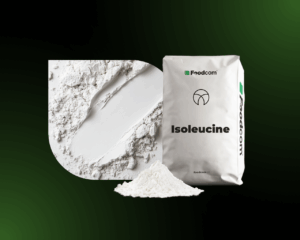- Stable prices for isoleucine, sodium bicarbonate, arginine in Europe and on key global markets.
- China remains the main supplier of amino acids, while Germany acts as a distribution hub for the EU.
- Growing importance of suppliers from India and the Middle East in the sodium bicarbonate segment.
- New regulations and decisions – Japan considers cutting ethylene production, the US introduces PET tariffs, and MOL develops chemical recycling in Hungary.
The global additives market is entering another phase of change. In recent weeks, we have seen stabilisation in the prices of isoleucine, sodium bicarbonate and arginine, as well as the emergence of new investments in the petrochemical sector. The focus remains on both price trends and the actions of the major companies, which are setting the stage for the industry as a whole. In our latest review, you will find information on events that could significantly impact global markets in the coming months.
Isoleucine
Isoleucine belongs to a group of amino acids of strategic importance to the global additives market, as it is widely used in the production of dietary supplements, functional foods and nutraceutical formulations. Demand for this raw material is driving the growth of the e-commerce segment, particularly in Asia and North America. China is the main supplier of isoleucine – the average export price is currently around EUR 24,200/MT.
The market has maintained a similar level of quotations in recent weeks. In Europe, prices were in the range of EUR 24,000-25,000/MT. The global market value in 2025 is estimated to be around €225 million and could grow to €356 million by 2035 with an average annual growth rate of 4.7%. Europe accounts for around EUR 47 million or nearly a quarter of the market share.
Sodium bicarbonate (baking soda)
Sodium bicarbonate has seen only minor price fluctuations in recent weeks. In Europe, its price has remained in the range of EUR 485-495/MT. On an annual basis, the value of exports fell. In Asia, prices were lower than in Europe due to the abundant availability of the raw material on the domestic market, while in the USA prices were higher, mainly due to transport costs and limited domestic supply.
The global market for sodium bicarbonate reaches a value of around €4.3bn in 2025 and could grow to more than €7.2bn by 2035 at an average growth rate of 5%. Suppliers from India and the Middle East are playing an increasingly important role and increasing their market share in Europe. Prices are forecast to remain in the EUR 485-495/MT range, with possible short-term fluctuations due to logistics costs and the situation in Asian markets.
L-Arginine
L-Arginine has remained price stable in recent weeks, with prices in Europe in the range of around EUR 2 600-2 800/MT. In the USA, prices averaged EUR 2,900-3,000/MT, while in China they remained closer to the EUR 2,300-2,400/MT level. Industry reports pay particular attention to Germany, which acts as the main reference market for Europe due to its large imports and distribution of amino acids to other EU countries.
On an annual basis, the global L-arginine market reaches a value of around €585 million in 2025 and could grow to more than €820 million by 2030, with an average annual growth rate of around 7%. Regional differences persist in the market due to energy costs, logistics and raw material availability, which may translate into price fluctuations between Europe, the US and China in the short term. Forecasts indicate that prices in Europe will remain in the range of EUR 2 600-2 800/MT in the coming quarters, with the global market growing at a rate similar to current forecasts.
What else?
Hungarian oil and petrochemical company MOL has announced the first pilot production of polyethylene and polypropylene at its Tiszaújváros plant using partly recycled plastic waste. The company combined recycled and conventional raw materials in a steam cracker using the certified ISCC Plus methodology. This is part of a broader strategy to bring chemically recycled polymers to the market. In parallel, the company is developing a project for a 40,000 tonne per year plastics waste processing plant, which will also be built in Tiszaújváros.
Japanese chemical companies Asahi Kasei, Mitsui Chemicals and Mitsubishi Chemical have established Setouchi Ethylene LLP to explore options for reducing ethylene production in western Japan by 2030. The companies are considering reducing capacity at the two crackers in operation or closing one of them, In parallel, they are exploring the introduction of renewable feedstocks such as bio-naphtha. The decision is part of broader plans to restructure Japan’s ethylene sector, which is facing increasing competition from China and weaker domestic demand.
Donald Trump has decided to impose tariffs on virgin and recycled polyethylene terephthalate (PET). Imported plastics will now be subject to tariffs of up to 50% depending on the country of origin. Until now, PET has entered the US without additional charges, facilitating the influx of cheaper raw material from Asia and weakening the position of domestic producers. The new regulations are expected to improve the competitiveness of local manufacturers and stabilise the recycled PET market, which has struggled with falling prices in recent months.

![A new dawn in the additives market: prices, trends and challenges [70th edition of the ADDITIVES newsletter] A new dawn in the additives market: prices, trends and challenges [70th edition of the ADDITIVES newsletter]](https://foodcom.pl/wp-content/uploads/2024/06/Foodcom_SA_Additives_Newsletter_Amino_Acids-1520x760.jpg)


![What is currently driving the additive market? [69th Edition of the ADDITIVES Newsletter] What is currently driving the additive market? [69th Edition of the ADDITIVES Newsletter]](https://foodcom.pl/wp-content/uploads/2023/08/Foodcom_SA_Newsletter_Additives-600x300.jpg)
![Functional additives as a competitive advantage – regulatory challenges remain [68th Edition of the ADDITIVES Newsletter] Functional additives as a competitive advantage – regulatory challenges remain [68th Edition of the ADDITIVES Newsletter]](https://foodcom.pl/wp-content/uploads/2023/08/Foodcom_SA_Additives_Newsletter-600x300.jpg)
![Add-ons on the move: Key factors shaping the market in February 2025. [67th Edition ADDITIVES Newsletter] Add-ons on the move: Key factors shaping the market in February 2025. [67th Edition ADDITIVES Newsletter]](https://foodcom.pl/wp-content/uploads/2024/06/Foodcom_SA_Additives_Newsletter_Amino_Acids-600x300.jpg)

